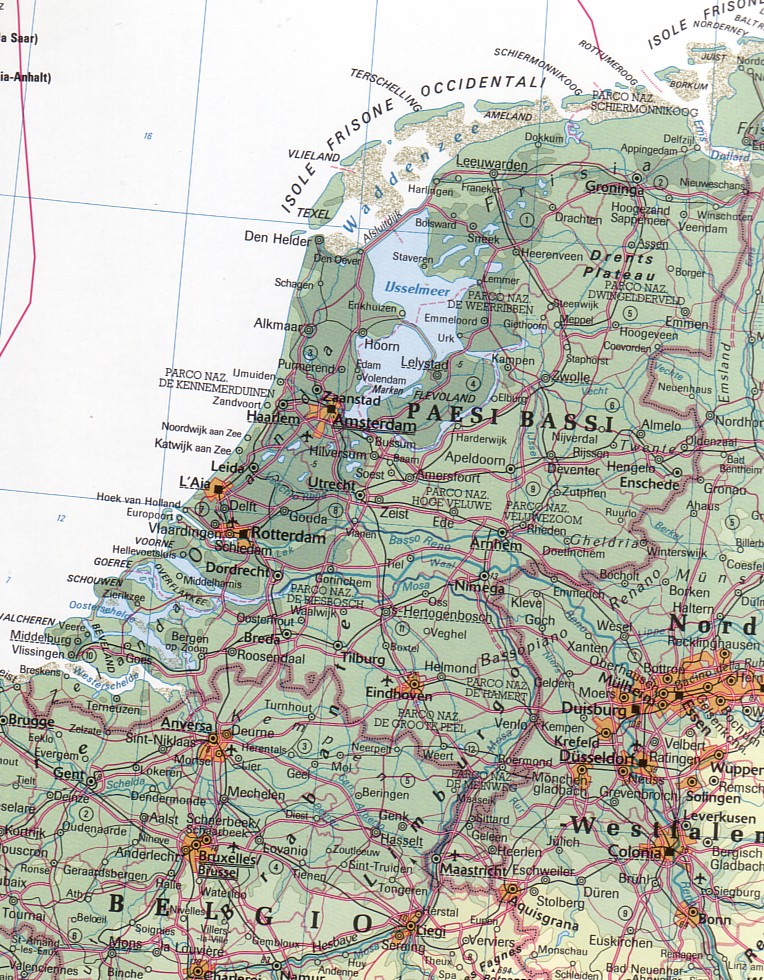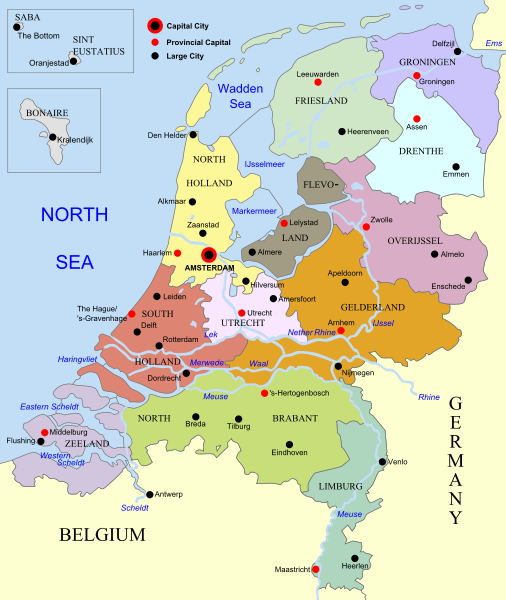1579: The northem half of the Seventeen Provinces formes the Unnion of
Utrecht, a treaty in which they promis to support each other in theis
defens against the Spanish army.
1581:The Union of Utrecht proclaimes
the declaration of indipendence by the Kingdom of Spain
1581-1648:The war between Spain and Netherlans continues
1581-88:After indipendence, the provinces of Holland, Zeeland,
Groningen, Friesland, Utrecht, Overijssel and Gelre form a confederation
known as the Republic of the Seven United Netherlands. All these provinces
are
autonomous and have their own government, the "States of the Province".
The State-General the confederal government, are seated in The Hague
and consist of representatives from each of the seven provinces.
Usually the head of Dutch Republic becames a member of Orange Family.
Therefore William I is Head of Republic in the period 1581-84. After of
his deaths, Maurice I, son of William, becames the head of Dutch Republic
in the period 1584-1625.
1614:The Netherlands found the colony of New Amsterdam (then
New York) in North America
1638:The Dutch colonis Mauritius islands
1610-41:The Dutch colonis Malacca
1624-44:The Dutch occupy the portuguese Brazil
1640: The Porrtugal becames indipendent by the Kingdom of Spain
1644-54:The Portugal ricaptures from the Netherlands
1648: Philip IV acceptes the independence of the seven northwestern
provinces in the Peace of Munster
1650:The Dutch conquer Caribbean islands of Sint Maarten,
Curacao, Aruba and Bonaire
1652:The Dutch found the colony of the Cape in South
Africa
1658:The Dutch conquer Colombo and Ceylon
1662:The Dutch conquer Nagappattiam, Cranganore and Cochin
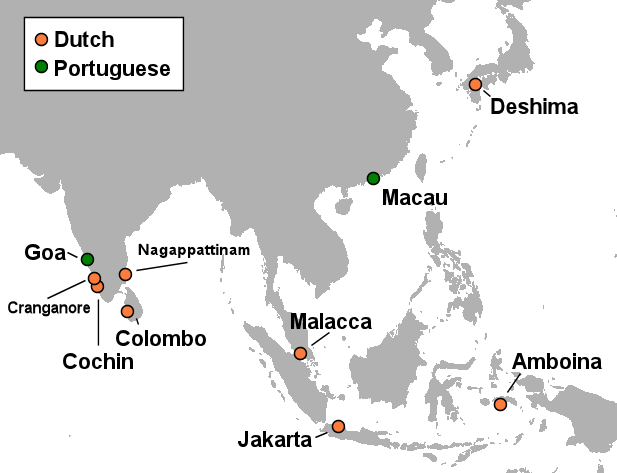
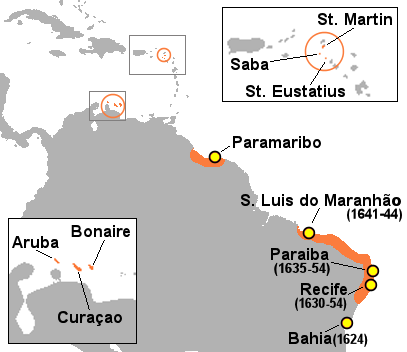
Territories of Netherlands in the 1650
(by Wikipedia)
1660-80: Plantation colonies are established by the Dutch and English along
the many rivers in the fertile Guyana
plains. The earliest documented colony in Guyana is along the Suriname
River and called Marshall's Creek. The area was named after
an Englishman.
Disputes arose between the Dutch and the English. In 1667, the Dutch
decided to keep the nascent plantation colony of Suriname conquered from
the English, resulting from the Treaty of Breda. The English were left with New Amsterdam, a small
trading post in North America, which is now known as New York City.
1672: William III Orange-Nassau becomes
stadtholder of Holland. In the same year William fights against the
France to defeat the Republic of Netherlands by the french-english
invasion.
1673: The war between Netherlands and France continues
with the addition of England alongside France.
1674: England sign the Treaty of Westminster
ending their involvement in the French-Dutch War. The France continues
to fight for four more years.
1674-78: The war between France and Netherland continues
in this period
1677: Marriage between William III of Netherland and
Mary Stuart nephew of english king Charles II
1678: The war between France and Netherland ends
signing the Treaty of Nijmegen. The Netherlands maintaines their
indipendence.
1689: William III becomes King of England
1690-1700: Netherland and England oppose to the french
dominance in Europe.
1702: Death of William III. The charge of stadtholder
rimaines vacant until 1747.
1747: the Dutch Republic becomes a monarchy with William
IV Orange-Nassau
1750-70: The Dutch lost the North America territories in
favor of the England
1795: The France invades the Dutch Republic. The
stadtholder William V flees to England. The Netherlands becames Batavian
Republic, a republic designated as the French Republic.
1788: The Prince of Orange acquiesced to British occupation and control of the Cape Colony.
In this period the Netherlands also possessed several other
colonies, but Dutch settlement in these lands was limited. Most notable were the
vast Dutch East Indies (=Indonesia) and Dutch Guiana (=Suriname). These 'colonies' were first administered by the Dutch
East India Company and the Dutch West India Company , both collective private enterprises. Three
centuries later these companies got into financial trouble, and the
territories in which they operated were taken over by the Dutch
government (in 1815 and 1791 respectively).
1806: Batavian Republic
becames Kingdom of Holland with king Louis Bonaparte, the brother of
Napoleon I of France
1810: The French Empire
invades the country and dissolves the Kingdom of Holland. The
Netherlands becomes a region of French Empire.
1813: The Netherlands remaines part of the French Empire until the
autumn, when Napoleon has defeated in the Battle of Leipzig and forced to
leave the country with his troops. The Netherlands became the kingdom of
Netherland and William Orange-Nassau, son of last stadtholder William V,
becames the first King of Netherlands
1815: the
Congress of Vienna formes the United Kingdom of the Netherlands by
expanding the Netherlands with Belgium
in order to create a strong country on the northern border of France. In addition, William became hereditary
Grand Duke of Luxebourg. The Congress of Vienna gave Luxembourg to
William as personal property in exchange for his German possessions,
Nassau-Dilleburg, Siegen, Hadamas and Diez.
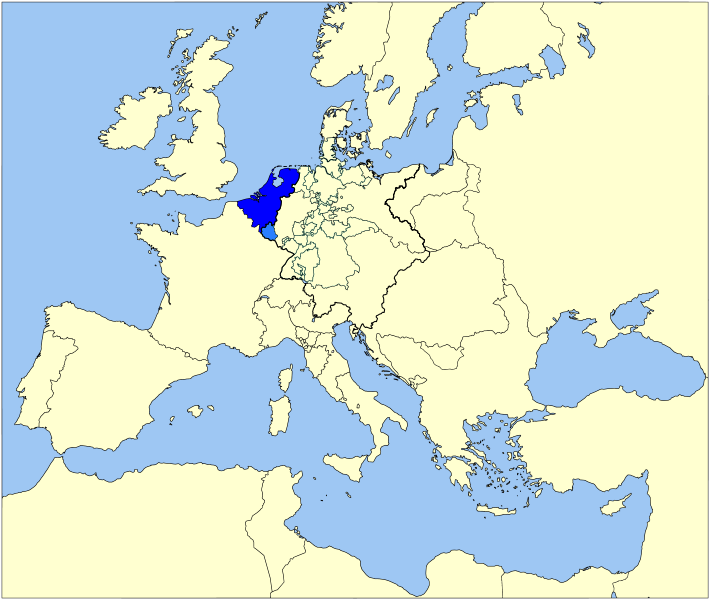
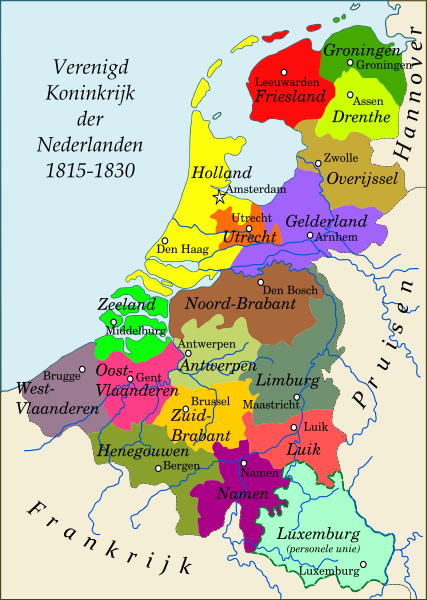
(By Wikipedia)
1815-30: Belgium don't want to stay with the Netherlands. The Dutch
territories as Indonesia and others became official colonies
1830:Belgium rebelles to the government of the Netherlands and
becames a indipendent country. While the personal union between Luxembourg and the Netherlands
has confirmed to 1890 was severed in when king William III of
Netherlands died with no surviving male
heirs.
1840-80: During its colonial period the Netherlands was heavily involved in
the slave trade. The Dutch planters relied heavily on African slaves to cultivate the coffee, cocoa, sugar cane and cotton
plantations along the rivers. Treatment of the slaves by their owners
was notoriously bad, and many slaves escaped the plantations. Slavery
was abolished by the Netherlands in Dutch Guiana in 1863, but the slaves
were not fully released until 1873, after a mandatory 10 year transition
period during which time they were required to work on the plantations
for minimal pay and without state sanctioned torture. As soon as they
became truly free, the slaves largely abandoned the plantations where
they had suffered for several generations in favor of the city
Paramaribo. Every year this is remembered during Keti Koti, 1 July, Emancipation Day (end of slavery).

Development of employment in Dutch Indonesia (By
Wikipedia)
1840-90: During this period, the Netherlands was slow to industrialize
compared to neighbouring countries, mainly because of the great
complexity involved in modernizing the infrastructure, consisting
largely of waterways, and the great reliance its industry had on
windpower.
1890: The King William III dies with no surviving male
heirs. The new queen is his daughter Willhelmina. However
Willhelmina doesn't get the throne of Luxembourg because women. The
Luxembourg passes to the house of Nassau-Weilburg, a junior branch of
the house of Nassau.
1914-18: Although the Netherlands remaines neutral during World War
I,, it has heavily involved in the war.
German general Count Schlieffen, who is Chief of the Imperial German
General Staff has originally planned to invade the
Netherlands while advancing into France in the original Schlieffen Plan. This
has changed by Schlieffen's successor Helmuth von Moltke the Younger in order to maintain Dutch
neutrality. Later during the war Dutch neutrality proves essential to
German survival until the blockade by Great Britain in 1916, when the
import of goods through the Netherlands was no longer possible. However,
the Dutch were able to continue to remain neutral during the war using
their diplomacy and their ability to trade.
1940-45:The Netherlands intended to remain neutral during the Second
Worl War. There were, however, contingency plans involving
the armies of Belgium, France and the United Kingdom. Regardless, Nazi
Germany invaded the Netherlands on 10 May 1940 as part of their campaign
against the Allied forces. French forces in the south and British ships
in the west come to help but turnes around quickly, evacuating many
civilians and several thousand German prisoners of war from the German
elite airborne divisions.
1940-45:The country has overrun in five days. Only after, but not because of,
the bombing of Rotterdam the main element of the Dutch army surrender
on 14 May 1940; although a Dutch and French force held the western part
of Zeeland for some time after the surrender. The Kingdom as such,
continue the war from the colonial empire; the governement in exile
reside in London.
1940-45: During the occupation, over 100,000 Dutch Jews
have rounded up to be transported to Nazi German concentration
camps in Germany German-occupied Poland and German-occupied
Czechoslovakia. By the time these camps have liberated only 876
Dutch Jews survive. Dutch workers were conscripte for forced labour in
German factories, civilians have killed in reprisal for attacks on
German soldiers, and the countryside has plundered for food for German
soldiers in the Netherlands and for shipment to Germany. Although there
were thousands
of Dutch who riskes their lives by hiding Jews from the Germans, as
recounted in The Hiding Place (book) by Corrie ten Boom and The Heart Has Reasons
by Mark Klempner, there are also thousands
of Dutch who collaborate with the occupying force in hunting down
hiding Jews. Local fascists and anti-Bolsheviks joined the Waffen-SS in the
4th SS Volunteer Panzegrenadier Brigade Netherlands, fighting on the
Eastern Front as well as other units.
1940-45: On 8 December 1941, the Netherlands declares war on Japan.
The government-in-exile then lost control of its major colonial
stronghold, the Netherlands East Indies (Indonesia), to Japanese forces in March 1942. "American-British-Dutch-Australian"
(ABDA) forces fight hard in some instances but were overwhelmed. During the
Japanese occupation of Indonesia, the Japanese interned Dutch
civilians and used Dutch and Indos (Eurasians of Dutch and Indonesian descent) alike as
forced labour, both in the Netherlands East Indies and in
neighbouring countries.
This includes forcing women to work as "comfort women" (sex slaves) for Japanese personnel.
The Dutch Red Cross reported the deaths in Japanese custody of 14,800
European civilians out of 80,000 intern and 12,500 of the 34,000 POW
captur.
A later U.N. report stated that 4 million people die in Indonesia as a
result of famine and forced labour (known as romusha) during the Japanese occupation.
Some military personnel escape to Australia and other Allied countries from where they carried on the
fight against Japan. The Japanese further the cause of independence
for the colony, so that after VE day many young Dutchmen find themselves fighting a colonial war
against the new republic of Indonesia.
Princess Juliana of the Netherlands, the only child of Queen
Wilhelmina and heir to the throne, find refuge in N Ottawa, Canada, with her two daughters, Beatrix and Irene, during the war. During
Princess Juliana’s stay in Canada, preparations are made for the birth
of her third child. To ensure the Dutch citizenship of this royal baby,
the Canadian Parliament pass a special law declaring Princess
Juliana's suite at the Ottawa Civic Hospital “extraterritorial”.
The day after Princess
Margriet's birth, the Dutch flag is flown on the Peace Tower . This
is the only time in history a foreign flag has
waved above Canada’s Parliament Buildings.
1944–45: the First Canadian Army is responsible for liberating much of the
Netherlands from German occupation. The joyous "Canadian summer" that
ensue after the liberation, forged deep and long-lasting bonds of
friendship between the Netherlands and Canada.
4 September 1948: After a reign of 57 years and 286 days, Wilhelmina
abdicates in favour of her daughter Juliana.
1949: Dutch troops occupied an area of 69 km2 (27 sq mi) of the
British zone of occupied Germany and annexed it. In this time, these
areas are inhabited by almost 10,000 people.
1947- 55: After the war, the Dutch economy prosper by
leaving behind an era of neutrality and gaining closer ties
with neighbouring states. The Netherlands is one of the
founding members of the Benelux (
Belgium, the
Netherlands and
Luxembourg) grouping, is among
the twelve founding members of the North Atlantic
treaty Organisation (NATO), and is among the six founding
members of the European Coal and Steel Community, which
later evolve into the EEC (Common Market) and then the
European Union.
1960-70: This years are a time
of great social and cultural change, such as rapid
ontzuiling, a term that describes the decay of the old
divisions along class and religious lines. Youths, and
students in particular, rejected traditional mores and
pushed for change in matters such as women's rights,
sexuality, disarmament, and environmental issues.
1962: The old queen Wilhelmina dies
1980: The queen Juliana abdicates. The daughter Beatrix
becames the new queen of Netherlands
1990-2000: In this period , the Netherlands is regarded
as a liberal country, considering its drug policy and
its legalisation of euthanasia.
1 April 2001: the Netherlands became the first nation to
recognize same-sex marriage.
20 March 2004: The old queen Juliana dies
2000-2005: Referendums are held on each island of the
Netherlands Antilles between June 2000 and April 2005 to
determine their future status. As a result the islands of
Bonaire, Sint Eustatius and Saba (the BES
islands) were to obtain closer ties with the Netherlands.
This led to the incorporation of these three islands into
the country of the Netherlands as special municipalities
upon the dissolution of the Netherlands Antilles.
The special municipalities are collectively known as the
Caribbean Netherlands .
10 October 2010 the Netherlands Anthilles—a former
country of the Kingdom of the Netherlands in the Caribbean—
is dissolved. 7
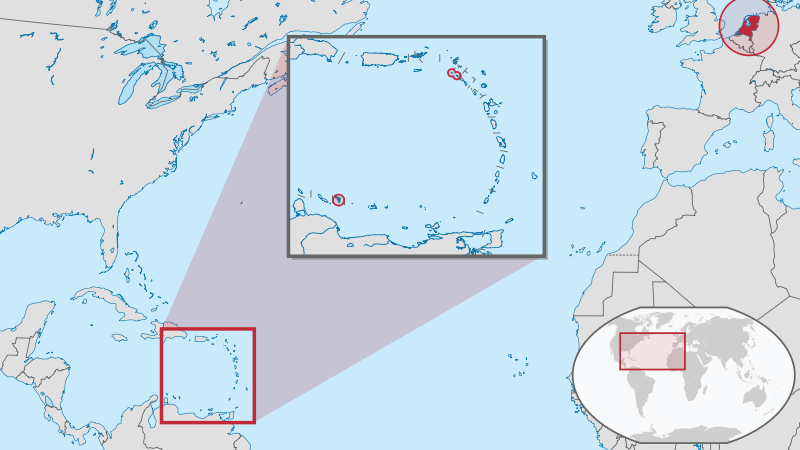
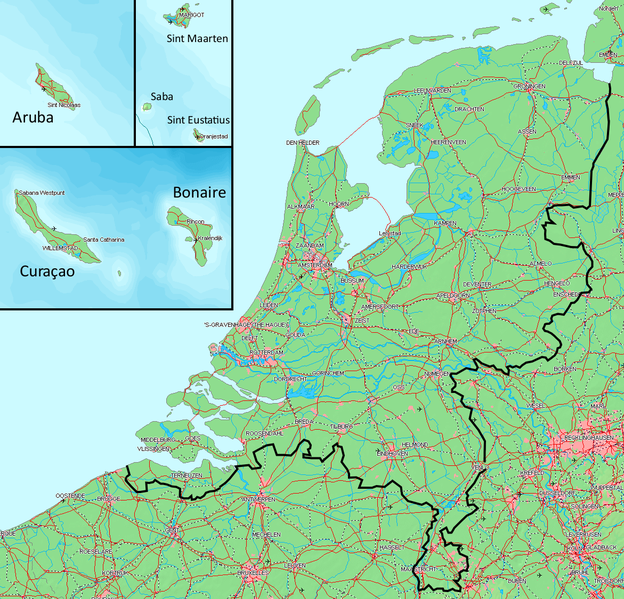
(By Wikipedia)
..................................................................................................................................................................................................
Geography
The country is divided into two main parts by three large rivers, the
Rhine (Rijn)
and its main distributaries, the Waal and the
Meuse (Maas). These rivers functioned as a natural barrier
between earlier fiefdoms and hence created traditionally a cultural divide, as is
evident in some phonetic traits that are recognizable north and south of
these "Large Rivers" (de Grote Rivieren).
The southwestern part of the Netherlands is a river delta and two tributaries of the
Scheldt
(Westerschelde and Oosterschelde). Only one significant branch of
the Rhine flows northeastward, the IJssel
river, discharging into the IJsselmeer, the former Zuiderzee ('southern sea'). This river also forms a linguistic
divide: people to the east of this river speak Dutch Low Saxon dialects (except for the province of
Friesland, which has its own language).
.........................................................................................................................................................................................................................
Climate
The predominant wind direction in the Netherlands is southwest, which
causes a moderate marittime climate, with cool summers and mild winters. This is
especially the case with places within direct proximity of the Dutch
coastline, which sometimes are over 10 °C warmer (in Winter) or cooler
(in Summer) than places in the (south)east of the country.
The following tables are based on mean measurements by the KNMI weather station in
De Bilt
between 1971 and 2000:
Ice days (maximum temperature below 0 °C) usually occur from December
until February, with the occasional rare ice day prior to or after that
period. Freezing days (minimum temperature below 0 °C) occur much more
often, usually ranging from mid November to late March, but not rarely
measured as early as mid October and as late as mid May. If one chooses
the height of measurement to be 10 cm. above ground instead of 150 cm.,
one may even find such temperatures in the middle of the summer.
Warm days (maximum temperature above 20 °C) in De Bilt are usually
measured in the time span of April until September, but in some parts of
the country such temperatures can also occur in March and October (this
is usually not in De Bilt, however). Summer days (maximum temperature
above 25 °C) are usually measured in De Bilt from May until August,
tropical days (maximum temperature above 30 °C) are rare and usually
occur only from June until August.
Precipitation throughout the year is relatively equally shared by
each month. Summer and Autumn months tend to gather a little bit more
precipitation than other months, mainly because of the intensity of the
rainfall rather than the frequency of rain days (this is especially the
case in Summer, when lightning too is much more frequent than
otherwise).
......................................................................................................................................................................................................
Politics
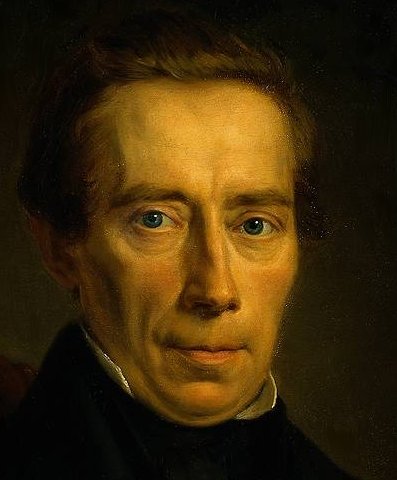
Thorbecke reformed the Dutch government to a
parliamentary monarchy.
The Netherlands has been a costitutional monarchy since 1815 and a
parliamentary democracy since 1848. The Netherlands is described as
a consociational state. Dutch politics and governance are characterised by an effort to achieve
broad consensus on important issues, within both the political community
and society as a whole. In 2008, The Economist ranked The Netherlands as the fourth
most democratic country in the world.
The monarch is the head of state, at present Queen Beatrix. Constitutionally, the position is equipped with
limited powers. The monarch can exert some influence during the
formation of a new cabinet where they serve as neutral arbiter
between the political parties. Additionally, the king (the title queen
has no constitutional significance) has the right to be informed and
consulted. Depending on the personality and qualities of the king and
the ministers, the king might have influence beyond the power
granted by the constitution.
In practice, the executive power is formed by the ministerraad, the deliberative council of the
Dutch cabinet. The cabinet consists usually of thirteen to sixteen
ministers and a varying number of state secretaries. One to three ministers are
ministers without portfolio. The head of government is the Prime
Minister of the Netherlands, who often is the leader of the
largest party of the coalition. In fact, this has been continuously the
case since 1973. The Prime Minister is a
primus inter pares, meaning he has no explicit powers beyond
those of the other ministers.

The Binnenhof is the centre of Dutch politics (The
pics by Wikipedia)
The cabinet is responsible to the bicameral parliament the
States-General which also has legislative powers. The 150 members of the
House of Representatives, the Lower House are elected in direct
elections, which are held every four years or after the fall
of the cabinet (by example: when one of the chambers carries a motion of
no-confidence, the cabinet offers its resignation to the monarch). The
Stes Provincial are directly elected every four years as well. The
members of the provincial assemblies elect the 75 members of the Senate, the
upper house, which has less legislative powers, as it can merely
reject laws, not propose or amend them.
Both trade unions and employers organisations are consulted beforehand in policymaking in
the financial, economic and social areas. They meet regularly with
government in the Social-Economic Council. This body advises government and its advice
cannot be put aside easily.
While historically the Dutch foreign policy was characterised by
neutrality, since the Second World War the Netherlands became a member of a large number
of international organisations, most prominently the UN, NATO and the
EU. The Dutch economy is very open and relies on international trade.
The Netherlands has a long tradition of social tolerance In the 18th century, while the
Dutch Reformed Church was the state religion, Catholicism and
Judaism were tolerated. In the late 19th century this Dutch
tradition of religious tolerance transformed into a system of
pillarisation, in which religious groups coexisted separately and
only interacted at the level of government. This tradition of tolerance
is linked to Dutch criminal justice policies on recreational drugs,
prostitution, LGBT rights, euthanasia and abortion which are among the most liberal in the world.
......................................................................................................................................................................................................
Administrative
divisions
Provinces of the Netherlands (the pics by Wikipedia)
The Netherlands is divided into twelve administrative regions, called
provinces, each under a Governor, who is called Commissaris van de Koningin
(Commissioner of the Queen), except for the province Limburg where the commissioner is called Gouverneur (Governor).
All provinces are divided into municipalities (gemeenten), 430 in total (13 March 2010).
The country is also subdivided in water districts, governed by a
water board (waterschap or hoogheemraadschap), each
having authority in matters concerning water management. As of 1 January
2005 there are 27. The creation of water boards actually pre-dates that
of the nation itself, the first appearing in 1196. In fact, the Dutch
water boards are one of the oldest democratic entities in the world
still in existence.
The administrative structure on the 3 Bes Islands is different. The islands have the status of openbare
lichamen (public bodies) and are generally referred to as special
municipalities. They are not part of a province.
Provinces of the Netherlands
|
|
Povince |
Capital |
Largest city |
Area
(km˛) |
Population
1-1-2010 |
Density
(per km˛) |
|
|
Drenthe |
Assen |
Assen |
2,641 |
490,981 |
186 |
|
|
Flevoland |
Lelystad |
Almere |
1,417 |
387,881 |
274 |
|
|
Friesland |
Leeuwarden |
Leeuwarden |
3,341 |
646,305 |
193 |
|
|
Gelderland |
Arnhem |
Nijmegen |
4,971 |
1,998,936 |
402 |
|
|
Groningen |
Groningen |
Groningen |
2,333 |
576,668 |
247 |
|
|
Limburg |
Maastricht |
Maastricht |
2,150 |
1,122,701 |
522 |
|
|
North Brabant |
s-Hertogenbosch |
Eindhoven |
4,916 |
2,444,158 |
497 |
|
|
North Holland |
Haarlem |
Amesterdam |
2,671 |
2,669,084 |
999 |
|
|
Overijssel |
Zwolle |
Enschede |
3,325 |
1,130,345 |
340 |
|
|
Utrecht |
Utrecht |
Utrecht |
1,385 |
1,220,910 |
882 |
|
|
Zeeland |
Middelburg |
Middelburg |
1,787 |
381,409 |
213 |
|
|
South Holland |
The Hague |
Rotterdam |
2,814 |
3,505,611 |
1,246 |
| Total |
33,751 |
16,574,989 |
491 |
|
Special municipalities of the Netherlands
|
|
Public Body |
Capital |
Largest city |
Area
(km˛) |
Population
1-1-2010 |
Density
(per km˛) |
| |
Bonaire |
Kralendijk |
Kralendijk |
288 |
13,389 |
46 |
| |
Saint Eustatius |
Oranijestad |
Oranjestad |
21 |
2,886 |
137 |
| |
Saba |
The Bottom |
The Bottom |
13 |
1,737 |
134 |
| Total |
322 |
18,012 |
56 |
|
...............................................................................................................................................................................................
Economy
The Netherlands has a very strong economy and has been playing a
special role in the European economy for many centuries. Since the 16th
century, shipping, fishing, trade, and banking have been leading sectors
of the Dutch economy. The Netherlands is one of the world's 10 leading
exporting countries. Foodstuffs form the largest industrial sector.
Other major industries include chemicals, metallurgy, machinery,
electrical, goods and tourism. Examples include (Unilever,
Heineken) , financial services (ING), chemicals (DSM), petroleum refining (Shell),
and electrical machinery (Philips, ASML).
The Netherlands has the 16th largest economy in the world and ranks
7th in GDP (nominal) per capita. Between 1998 and 2000 annual
economic growth (GDP) averaged nearly 4%, well above the European average. Growth slowed
considerably from 2001 to 2005 with the global economic slowdown, but
accelerated to 4.1% in the third quarter of 2007.
Inflation is 1.3%, and unemployment is at 4.0% of the labour force. By
Eurostat standards, unemployment in the Netherlands is at 4.1%
(April 2010) – the lowest rate of all European Union member states.The Netherlands also has a relatively low
GINI coefficent of 0.326. Despite ranking only 7th in GDP per
capita, UNICEF ranked the Netherlands 1st in child well-being.
On the
Index of Economic Freedom Netherlands is the 13th most free market
capitalist economy out of 157 surveyed countries.
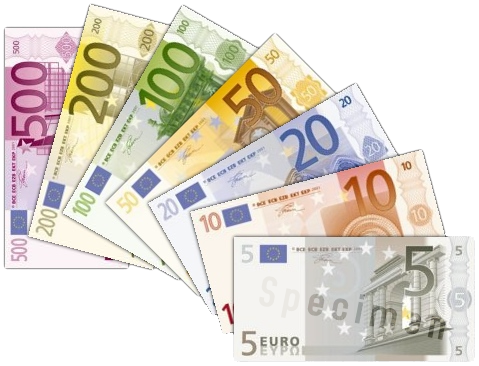
The Netherlands introduced the euro in 1999. It is one of the 16
sovereign states that make up the Eurozone. (The pics by
Wikipedia)
Amsterdam is the financial and business capital of the Netherlands.
The
Amsterdam Stock Exchange (AEX), part of Euronext, is the world's oldest stock exchange and is one of
Europe's largest bourses. It is situated near Dam Square in the city's centre. As a founding member of the
euro, the Netherlands replaced (for accounting purposes) its former
currency, the "Gulden" (guilder),
on 1 January 1999, along with 15 other adopters of the Euro. Actual euro
coins and
banknotes followed on 1 January 2002. One euro was equivalent to
2.20371 Dutch guilders.
The Netherlands' location gives it prime access to markets in the UK
and Germany, with the port of Rotterdam being the largest port in Europe. Other important
parts of the economy are internationa trade (Dutch colonialism started with cooperative
private enterprises such as the VOC), banking and transport. The Netherlands successfully addressed the issue of
public finances and stagnating job growth long before its European
partners. Amsterdam is the 5th busiest tourist destination in Europe
with more than 4.2 million international visitors.
The country continues to be one of the leading European nations for
attracting foreign direct investment and is one of the five largest
investors in the U.S. The economy experienced a slowdown in 2005, but in
2006 recovered to the fastest pace in six years on the back of increased
exports and strong investment. The pace of job growth reached 10-year
highs in 2007.The Netherlands moved up from the 11th position in the
Global Competitiveness Index
to the 9th position in 2007.
.................................................................................................................................................................................................
Demographics
The Netherlands has an estimated popolution of 16,491,852 (as of 8 March 2009).
It is the 11th most popolous country in Europe and the 61st most
popolous countryin the world. Between 1900 and 1950, the
country's population almost doubled from 5.1 to 10.0 million people.
From 1950 to 2000, the population further increased from 10.0 to 15.9
million people, but the popolation growth decreased compared to the previous fifty years.
The estimated growth rate is currently 0.436% (as of 2008).
The
fertility rate in the Netherlands is 1.66 children per woman (as of
2008),
which is high compared to many other European countries, but below the
2.1- rate required for natural popolation replacement. Life expentancy is high in the Netherlands: 79 years for newborn
girls and 78 for boys (2007). The country has a migration rate of 2.55 migrants per 1,000 inhabitants.
The majority of the population of the Netherlands are ethnically
Dutch. A 2005 estimate counted: 80.9% Dutch, 2.4%
Indonesian (Indo-Dutch, South Moluccan) , 2.4% German, 2.2% Turkish, 2.0%
Surinamese, 1.9% Moroccan,
0.8%
Antillean and
Aruban,
and 6.0% others.
The
Dutch are among the tallest people in the world, with an average height of 1.81 metres (5 ft 11 in) for adult males and 1.67 metres
(5 ft 6 in) for adult females. People in the south are on average about
2 cm shorter than those in the north.
The Netherlands is the 25th most densely populated country in the world, with 395 inhabitants
per square kilometre (1,023 /sq mi)—or 484 inhabitants per square
kilometre (1,254 /sq mi) if only the land area is counted. It is the
most densely populated country in Europe with a population over 16
million. The Randstad is the country's largest conurbation located in the west of the country and contains the four
largest cities: Amsterdam in the province
North Holland, Rotterdam and The Hague in the province South
Holland and Utrecht in the province Utrecht . The Randstad has a population of 7 million inhabitants and
is the 6th largest metropolitan area in Europe.
Dutch people or descendants of Dutch people are also found in migrant communities
worldwide, notably in Canada, Australia, South Africa and the United
States. According to the 2006 U.S. Census, more than 5 million Americans
claim total or partial Dutch ancestry.
There are close to 3 million Dutch-descended Afrikaners living in
South Africa.
In 1940, there were 290,000 Europeans and Eurasians in Indonesia,
but most have since left the country.
..........................................................................................................................................................................................................................................
Language
The official language is Dutch, which is spoken by the vast majority of the inhabitants.
Another official language is Frisian, which is spoken in the northern province of
Friesland, called Fryslân in that language. A dialect of
Frisian and Dutch is spoken in most villages in the west of the province
of Groningen.
Frisian is co-official only in the province of Friesland, although with
a few restrictions. Several dialects of Low Saxon (Nedersaksisch in Dutch) are spoken in much of the
north and east, like the Tweants in the Twente region, and are recognised by the Netherlands as regional
languages according to the European Charter for Regional or Minority
Languages, as well as the Meuse-Rhenish Franconian varieties in the southeastern province of
Limburg, here called Limburgish language. English is an official language in the special municipalities of
Bonaire, Saba and Sint Eustatius (BES Islands). It is widely spoken on Saba and Sint Eustatius.
Papiamento is an official language in the special municipality of
Bonaire.
There is a tradition of learning foreign languages in the
Netherlands: about 70% of the total population have good knowledge of
conversational English, 55– 59% of German, and 19% of French. English is a mandatory course in all secondary schools.
In most lower level secondary school educations (VMBO),one additional modern foreign language is mandatory during the first two
years. In higher level secondary schools, two additional modern foreign
languages are mandatory during the first three (HAVO)
or four (VWO) years. The standard modern languages are French and German, although
schools can change one of these modern languages with Spanish, Turkish,
Arabic, or Russian.
Additionally, schools in the Frisia region teach and have exams in
Frisian, and schools across the country teach and have exams in ancient
Greek and Latin for VWO.
........................................................................................................................................................................................................................................
Education
The Netherlands has compulsory education from age 4 to 18 (or 16 as a
study is completed which has given the student adequate professional
skills to start as a professional in the labour market).
Pupils attend primary from (on average) age 4 to age 12. The very first
grade is not mandatory, the other 7 grades are. After that they continue
their education at secondary school minimally until age 16; which indicates one of
three tracks in the Dutch educational system.
The vocational track starts with VMBO, which
is seen as the lowest level of secondary education and lasts four years.
Successfully completing VMBO results in a low level vocational degree
and/or gives access to higher (secondary) levels vocational education.
Completion of second level vocational education results in professional
skills and gives access to further study a university of applied
science.
The medium level HAVO lasts five years. After completion a student can attend a
university of applied science, which award professional bachelor
degrees. A degree at a university of applied science gives access to the
university system.
The highest level of high school education is VMO, which lasts six years, completion of which allows students to
attend a university.
University consists of a three year bachelor's degrees,
followed by one or two year master's degrees. A master's degree is
required to start a four year doctoral degree. Doctoral candidates in
the Netherlands are temporary employees of a university.
....................................................................................................................................................................................................
